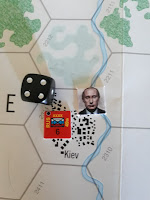One month into the war in Ukraine and some of the second and third order effects are starting to become evident. The disruption to Russian energy supplies are already being felt in the oil and gas markets. However, while these attract our attention, there are also little noticed changes that could have a much deeper impact. We have yet to tease out fully the impact of the war - or special operation, as some like to call it - upon other markets and other regions of the world. One such market is that of foodstuffs, and one such region is North Africa and the Middle East.
The combined output of Russia and Ukraine represents just under a third of the global supply of wheat. The war is likely to disrupt this supply both in the short term and the long term. In the short term, the amount of acreage under cultivation in Ukraine is likely to fall owing to the war. Even if, a 2022 harvest is gathered, the disruption of the Black Sea ports - Odessa, Kherson, and Mariupol - is likely to interrupt significantly the flow of wheat. If Russia increases its acreage by a compensating amount, this is unlikely to have an impact on global wheat markets because of difficulties in accessing letters of credit and counter-party trade to actually deal in Russian wheat. There is also the possibility of a Russian export ban for wheat, except to favoured customers.
All of this suggests a bit of a hole in the supply of wheat in the short term. It could be offset by drawing from reserves, but these are about a third below what would be considered normal. It is not only the wheat market that has come under pressure. Other grains, such as barley, and sources of vegetable oil, such as sunflower, are dominated by Russia and Ukraine. Prices of these 'soft' commodities are already rising by very large amounts (30% between the invasion of February 24th and mid-March).
There are further concerns about the long term consequences of the war upon the acreage under cultivation. In recent days, there has been some discussion about the possible use of NBC (Nuclear, Biological, and Chemical) weapons in the context of the war. The long term consequences of using such weapons is at present unknown. The fear is that their use would poison the soil for some time to come - possibly decades, possibly generations. If that were to happen, then we would be thinking of a permanent reduction in the acreage under cultivation rather than a temporary one. This would lead us into a much different world than the one we are accustomed to.
In addition to issues around the acreage under cultivation, there are also more general issues around global arable yields. Russia and Belarus - both suffering from international sanctions - are leading suppliers of potash, a key ingredient in modern fertiliser manufacture. Modern agriculture is heavily reliant upon mechanisation - which faces increases in the cost of fuel - and fertilisation - which relies on products which originate in Russia. Arable products are then, in turn, used as animal feedstuffs. It is not difficult to see that the cost of all foodstuffs are set to rise in the very near future.
It is possibly even more disturbing when we consider where these impacts might be felt. Much of the Russian and Ukrainian grain harvest is transported across the Black Sea to Turkey, where it is processed from the raw grains into a state where it can be sold to the consumer. The processed grains are, in turn, shipped on largely to the Middle East, North Africa, and parts of Asia. Something in the region of 800 million people rely upon this source of grains. These are rather volatile parts of the world. It is not beyond our imagination to envisage a Second Arab Spring. It was the rise in food prices that fuelled the original Arab Spring of 2011.
The western response to this is likely to be - as it was a decade ago - inadequate. It does, however, create an opportunity for Russia, which has a footprint in the region, and China, which has ambitions in the region, to extend their influence even further than they already have. Europe and North America could counter this, but one wonders if they are prepared to devote levels of financial resources that are commensurate with those of, say, the BRI?
Whether this possibility constitutes a break in the global food supply chain is a matter of conjecture. It does suggest a different future from the past which we are accustomed to. There is the possibility of an increasingly hungry world, which creates the potential to use food aid as a source of soft power. In that case, politics would replace commerce in deciding who gets to eat and who goes hungry.
Stephen Aguilar-Millan
© The European Futures Observatory 2022

